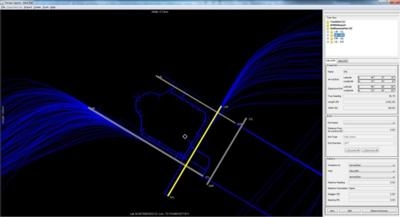Sat, Jan 03, 2015
Software Simulates Arriving And Departing Traffic To Assist In Runway Assignments And Sequencing
For several years, the FAA has used the results of an airport capacity tool called the runwaySimulator model that was developed by MITRE to efficiently evaluate an airport’s capacity.

The tool is now being made publicly available to those with interests in aviation and airport planning. The tool can be used to assess an airport’s existing capacity, as well as capacity improvements with new infrastructure or flight procedures.
The runwaySimulator model simulates arriving and departing traffic at an airport, the decisions made about runway assignment and sequencing, and the flight operations themselves. The model generates a randomized traffic sample that keeps pressure on the airport. The traffic sample reflects an airport's mix of aircraft types, which differ in their performance parameters.
FAA separation standards are codified in the software as rules that govern pairs of flight operations, and these are modified to represent common pilot and controller behaviors. The runway configuration is set and exceptions noted to prohibit use of specified runways by certain aircraft types or to set aside runways for exclusive use by, say, general aviation traffic. A heuristic algorithm assigns runways and sequences traffic to balance efficiency and delay while respecting separation requirements and runway eligibilities.
When used to estimate capacity, runwaySimulator generates traffic so there is constant demand on the runway system. It does this for various arrival-departure mixes and, for each, simulates steady-state operations for several hundred hours. The average throughput achieved is recorded for each arrival-departure mix and used to create the airport's capacity "curve" (i.e., a Pareto frontier). The model provides a variety of measurements and visualizations to the analyst to verify and validate the simulation.
The tool can be used to estimate runway capacity with current and future operations. However, runwaySimulator does not evaluate most non-runway constraints at the airport nor limitations elsewhere in the national airspace system. Such constraints may include taxiway or gate constrains, terminal airspace congestion, Air Traffic Control traffic management initiatives, and seasonal limitations due to high temperatures that restrict aircraft climb rates.
(Runway simulator screenshot provided by the FAA)
More News
Ultrahigh Frequency (UHF) The frequency band between 300 and 3,000 MHz. The bank of radio frequencies used for military air/ground voice communications. In some instances this may >[...]
During The 7 Second Descent, There Was Another TAWS Alert At Which Time The Engine Remained At Full Power On October 24, 2025 at 2115 mountain daylight time, a Cirrus SR22T, N740TS>[...]
From 2009 (YouTube Edition): Educational Organization Aims to Inspire by Sharing Tuskegee Story Founding leader Don Hinz summarized the Red Tail Project’s mission in simple, >[...]
“This feels like an important step since space travel for people with disabilities is still in its very early days... I’m so thankful and hope it inspires a change in m>[...]
Also: New Katanas, Kern County FD Training, IndiGo’s Botched Roster, MGen. Leavitt Named ERAU Dean The Australian Transportation Safety Bureau (ATSB) has wrapped up its inves>[...]
 ANN's Daily Aero-Term (12.19.25): Ultrahigh Frequency (UHF)
ANN's Daily Aero-Term (12.19.25): Ultrahigh Frequency (UHF) NTSB Prelim: Cirrus Design Corp SR22T
NTSB Prelim: Cirrus Design Corp SR22T Classic Aero-TV: The Red Tail Project--Carrying the Torch of the Tuskegee Airmen
Classic Aero-TV: The Red Tail Project--Carrying the Torch of the Tuskegee Airmen Aero-News: Quote of the Day (12.19.25)
Aero-News: Quote of the Day (12.19.25) Airborne 12.17.25: Skydiver Hooks Tail, Cooper Rotax Mount, NTSB v NDAA
Airborne 12.17.25: Skydiver Hooks Tail, Cooper Rotax Mount, NTSB v NDAA



